(完整版)四年级下册一般现在时.docx
(完整版)一般现在时课件
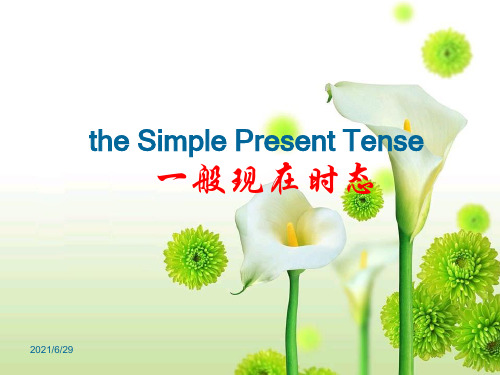
一般疑问句: Be+主语+表语?
Are your parents doctors? Yes, they are./No, they aren’t. Is Mr Long 28 years old? Yes, he is./No, he isn’t.
2021:表示行为动作的词语
3. 经常、习惯、反复做的事情 We have lunch at 12:30. We go to school on Monday.
2021/6/29
be 动词的一般现在时:
be: am, is, are
用be动词的适当形式填空: I ‗a‗m‗‗ he‗‗is‗‗ she ‗i‗s‗‗
iti‗s‗‗‗ Tomis‗‗‗‗
否定句:
☺主语(I/We/You/They)+do+ not+动词原形+其他 I don’t watch TV on Sunday. ☺主语(He/She/It)+does +not+动词原形+其他 He doesn’t watch TV at home on Sunday.
2021/6/29
Practice:
5. 特殊情况 have– has
把下面的行为动词变为第三人称单数形式:
go―goes
carry―carries ride―rides
open―opens
have ― has
teach―teaches brush― brushes dey―deys
play―plays
finish―finishes
2021/6/29
1.一般情况直接加s e.g. reads, plays, works, makes
一般现在时(完整版)
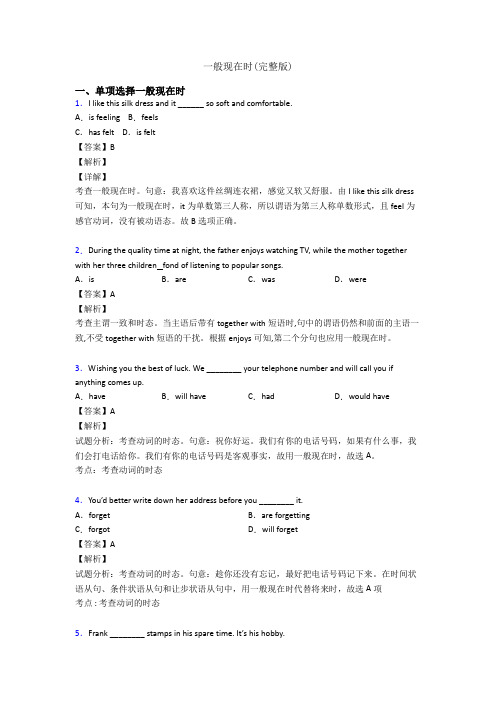
C.won’t haveD.hadn’t had
【答案】B
【解析】
试题分析:考查动词时态及句意理解。句意:因为镇上没有好的餐馆,我们只好在家里用当地食品招待外国客人。虽然句中用yesterday作为时间状语,但是没有好餐馆是现在这一段时间的一个事实,所以应该采用一般现在时态,故B正确。
A.is collectingB.collects
C.collectedD.was collecting
【答案】B
【解析】
试题分析:考查时态。句意:Frank在他的空闲时间收集邮票。这是他的爱好。根据“It’s his hobby”可知,这是Frank经常做的事情。用一般现在时,故选B。
考点:考查时态
【答案】D
【解析】
【详解】
考查时态。句意:时间安排如此紧张,如果他们要完成这个任务,每个人都要全力以赴。在条件状语从句里应该使用一般现在时代替将来时,所以if条件状语从句中使用be to dosth。故D项正确。
16.So far, Mike has spent about $28,000 on the house and __________ it to cost about $38,000 when it is finished and furnished.
18.—I pressed the button just now, but no copies came out.
—The machine _______ well. You must have made an error in operation.
A.runsB.ran
C.had runD.has run
(完整)一般现在时
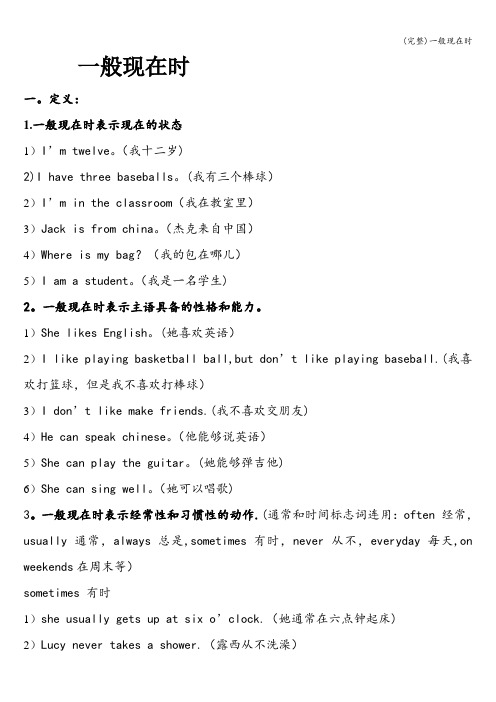
(完整)一般现在时一般现在时一。
定义:1.一般现在时表示现在的状态1)I’m twelve。
(我十二岁)2)I have three baseballs。
(我有三个棒球)2)I’m in the classroom(我在教室里)3)Jack is from china。
(杰克来自中国)4)Where is my bag?(我的包在哪儿)5)I am a student。
(我是一名学生)2。
一般现在时表示主语具备的性格和能力。
1)She likes English。
(她喜欢英语)2)I like playing basketball ball,but don’t like playing baseball.(我喜欢打篮球,但是我不喜欢打棒球)3)I don’t like make friends.(我不喜欢交朋友)4)He can speak chinese。
(他能够说英语)5)She can play the guitar。
(她能够弹吉他)6)She can sing well。
(她可以唱歌)3。
一般现在时表示经常性和习惯性的动作.(通常和时间标志词连用:often 经常,usually通常,always 总是,sometimes有时,never从不,everyday每天,on weekends在周末等)sometimes 有时1)she usually gets up at six o’clock.(她通常在六点钟起床)2)Lucy never takes a shower.(露西从不洗澡)3)We sometimes play basketball after school。
(我们有时在放学后打篮球)4)I always do my homework on weekends(我总是在周末做作业)二.一般现在时谓语动词的变化.一般现在时动词可分为两大类(1)含be(is/am/are)动词和情态动词can一类。
(完整word)上海版牛津英语4B语法总结之一——一般现在时,文档
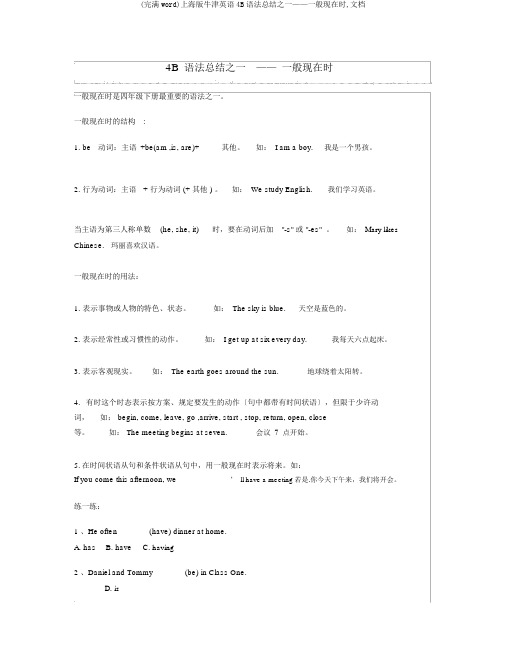
4B语法总结之一——一般现在时一般现在时是四年级下册最重要的语法之一。
一般现在时的结构:1. be动词:主语+be(am ,is, are)+其他。
如:I am a boy.我是一个男孩。
2. 行为动词:主语+ 行为动词 (+ 其他 ) 。
如:We study English.我们学习英语。
当主语为第三人称单数(he, she, it)时,要在动词后加"-s" 或 "-es" 。
如:Mary likes Chinese.玛丽喜欢汉语。
一般现在时的用法:1. 表示事物或人物的特色、状态。
如:The sky is blue.天空是蓝色的。
2. 表示经常性或习惯性的动作。
如:I get up at six every day.我每天六点起床。
3. 表示客观现实。
如:The earth goes around the sun.地球绕着太阳转。
4.有时这个时态表示按方案、规定要发生的动作〔句中都带有时间状语〕,但限于少许动词,如: begin, come, leave, go ,arrive, start , stop, return, open, close等。
如: The meeting begins at seven.会议7点开始。
5.在时间状语从句和条件状语从句中,用一般现在时表示将来。
如:If you come this afternoon, we’ ll have a meeting若是.你今天下午来,我们将开会。
练一练:1 、He often _______(have) dinner at home.A. hasB. haveC. having2 、Daniel and Tommy _______(be) in Class One.D. is3 、The girl _______(teach) us English on Sundays.A. is teachingB. teachC. teachesD. teaching。
一般现在时(完整版)
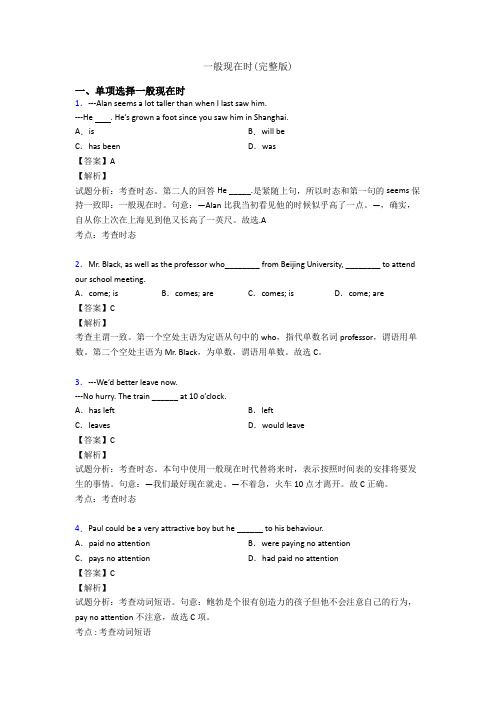
一般现在时(完整版)一、单项选择一般现在时1.---Alan seems a lot taller than when I last saw him.---He . He’s grown a foot since you saw him in Shanghai.A.is B.will beC.has been D.was【答案】A【解析】试题分析:考查时态。
第二人的回答He _____.是紧随上句,所以时态和第一句的seems保持一致即:一般现在时。
句意:—Alan比我当初看见他的时候似乎高了一点。
—,确实,自从你上次在上海见到他又长高了一英尺。
故选.A考点:考查时态2.Mr. Black, as well as the professor who________ from Beijing University, ________ to attend our school meeting.A.come; is B.comes; are C.comes; is D.come; are【答案】C【解析】考查主谓一致。
第一个空处主语为定语从句中的who,指代单数名词professor,谓语用单数。
第二个空处主语为Mr. Black,为单数,谓语用单数。
故选C。
3.---We’d better leave now.---No hurry. The train ______ at 10 o’clock.A.has left B.leftC.leaves D.would leave【答案】C【解析】试题分析:考查时态。
本句中使用一般现在时代替将来时,表示按照时间表的安排将要发生的事情。
句意:—我们最好现在就走。
—不着急,火车10点才离开。
故C 正确。
考点:考查时态4.Paul could be a very attractive boy but he ______ to his behaviour.A.paid no attention B.were paying no attentionC.pays no attention D.had paid no attention【答案】C【解析】试题分析:考查动词短语。
小学阶段的一般现在时

Part Three 一般现在时与其他时态
的区别
与一般过去时的区别
定义:一般现在时表示现在发生的动作或状态,一般过去时表示过去发生的动作或状态
时间状语:一般现在时的时间状语包括now、today、this week等,而一般过去时的时间 状语包括yesterday、last week、ago等
动词形式:一般现在时的动词形式为原形,一般过去时的动词形式为过去式
否定句句型结构
谓语动词前加 助动词do not
(don't)
谓语动词前加 系动词be的一 般现在时形式
谓语动词前加 助动词have not (haven't)
谓语动词前加 助动词助动词 have (has)
一般疑问句句型结构
谓语动词提前:Do you want to go to the park? 助动词提前:Is she a student? 情态动词提前:Can you help me? 疑问词提前:What time does he get up?
用法:表示将来的动作或状态,强调客观事实或普遍真理。
例子:I don't know when he will come back, but if he does, I will let you know.
注意事项:在宾语从句中,一般现在时不能与具体的时间状语连用,如next year、 tomorrow等。
小学阶段的一般 现在时
/单击此处添加副标题内容/
汇报人:XX
目 录
Part One.
一般现在时的基 本概念
Part Two.
小学阶段的一般 现在时用法
Part Three.
一般现在时与其 他时态的区别
小学四年级英语一般现在时
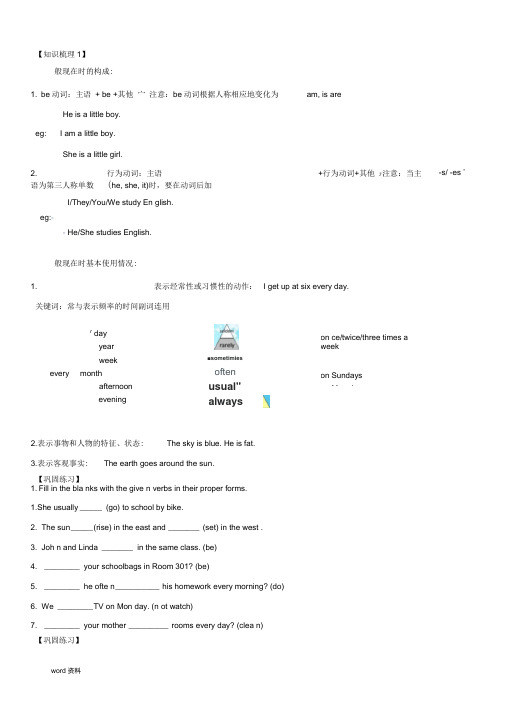
【知识梳理1】般现在时的构成:1. be动词:主语+ be +其他宀注意:be动词根据人称相应地变化为am, is areHe is a little boy.eg: I am a little boy.She is a little girl.2. 行为动词:主语+行为动词+其他T注意:当主语为第三人称单数(he, she, it)时,要在动词后加I/They/You/We study En glish.eg:-- He/She studies English.般现在时基本使用情况:1. 表示经常性或习惯性的动作:I get up at six every day.关键词:常与表示频率的时间副词连用1. Fill in the bla nks with the give n verbs in their proper forms.1.She usually _____ (go) to school by bike.2. The sun _____ (rise) in the east and _______ (set) in the west .3. Joh n and Linda _______ in the same class. (be)4. ________ your schoolbags in Room 301? (be)5. ________ he ofte n __________ his homework every morning? (do)6. We ________ T V on Mon day. (n ot watch)7. ________ your mother _________ rooms every day? (clea n)【巩固练习】-s/ -es 'r dayyeareveryweekmonthafternooneveningoftenusual"always2.表示事物和人物的特征、状态: The sky is blue. He is fat.3.表示客观事实: 【巩固练习】The earth goes around the sun.on ce/twice/three times aweekon Sundayson Mon days■sometimiesI.选择最恰当的答案)1. you have a book?A. DoB. AreC. IsD. Have)2. They on a farm.A. workingB. is workC. workD. is worked)3. ---- Does Peter like to watch TV?A. Yes, he likes )4. She doesn A. doing)5. HowA. do, goB. No, he doesn 'tC. Yes, he ' d likeher homework in the afternoon.B. to doC.doesMr. Brown to America?B. is, goC. does, goD. No, he likesD. doD. does, goes)6. Where ' s my camera? I A. am not finding)7. -HowA. does; go)8.—A. Do; I am)9.A. Is, leaveit.B. am not seeingC. can ' t findD. can ' t look athe go to work?B. do; goesyou usually late for school?B. Does; notshe)10. Mr. YangA. teaches our【知识梳理2】be动词,行为动词句型:1.Be动词一般现在时的句型——He----No,home at six every day?B. Does, leaveEn glish thisterm.B. teaches us肯定句:sb+ be+其他be根据人称变为am,is are to work by bike.C. do; goD. does; goeseg: He is a teacher. I am a student.C. Are; I ' m notD. Are; I aren 'tC. Is, leavesD. Does, leftC. teach usD. teach our They are workers.否定句:sb+ be+not+其他eg: He is not a teacher. I am not a student.They are not workers. 般疑问句:be+sb+其他Is he a teacher? -Yes, he is. / No, he isn 't.Are you a stude nt? Are they workers?1. Mike ______ (like) cooki ng.2. They ______ (have) the same hobby.3. My aunt _____ (look) after her baby carefully.4. You always ______ (do) your homework well.5. I ______ (be) ill. I ' m staying in bed.6. She _______ (go) to school from Mon day to Friday.7. Liu Tao ______ (do) not like PE.8. The child ofte n______ (watch) TV in the evening.9. Su Hai and Su Yang _______ (have) eight less ons this term.10. ---- What day ______ (be) it today? ---- It ' s Saturday.11. 按要求改写句子。
四年级下册英语一般现在时讲解和练习译林版
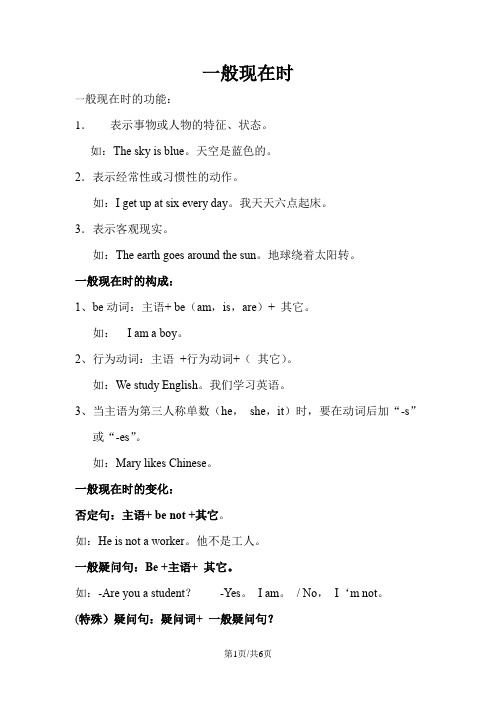
一般现在时一般现在时的功能:1.表示事物或人物的特征、状态。
如:The sky is blue。
天空是蓝色的。
2.表示经常性或习惯性的动作。
如:I get up at six every day。
我天天六点起床。
3.表示客观现实。
如:The earth goes around the sun。
地球绕着太阳转。
一般现在时的构成:1、be动词:主语+ be(am,is,are)+ 其它。
如:I am a boy。
2、行为动词:主语+行为动词+(其它)。
如:We study English。
我们学习英语。
3、当主语为第三人称单数(he,she,it)时,要在动词后加“-s”或“-es”。
如:Mary likes Chinese。
一般现在时的变化:否定句:主语+ be not +其它。
如:He is not a worker。
他不是工人。
一般疑问句:Be +主语+ 其它。
如:-Are you a student?-Yes。
I am。
/ No,I‘m not。
(特殊)疑问句:疑问词+ 一般疑问句?如:Where is my bike?2。
行为动词的变化。
否定句:主语+ don’t(doesn‘t )+ 动词原形(其它)。
如:I don’t like bread。
当主语为第三人称单数时,要用doesn‘t构成否定句。
如:He doesn’t often play。
一般疑问句:Do+主语+动词原形+(其它)?如:Do you often play football?- Yes,I do。
/ No,I don‘t。
当主语为第三人称单数时,要用does构成一般疑问句。
如:- Does she go to work by bike?- Yes,she does。
/ No,she doesn’t。
主语为第三人称单数时,动词的变化规则1.一般情况下,直接加-s,如:cook-cooks,milk-milks 2.以s、x、sh、Ch、o结尾,加-es,如:guess-guesses,wash-washes,go-goes2.以“辅音字母+ y”结尾,变y为i,再加-es,如:study-studies一般现在时用法专练:一、写出下列动词的第三人称单数drink ________ go _______ stay ________make________look_________ have_______pass_______ carry ____come________watch______ plant_______ fly ________study_______ brush________ do_________teach_______wash_______二、用括号内动词的适当形式填空。
一般现在时(包括习题和答案).docx
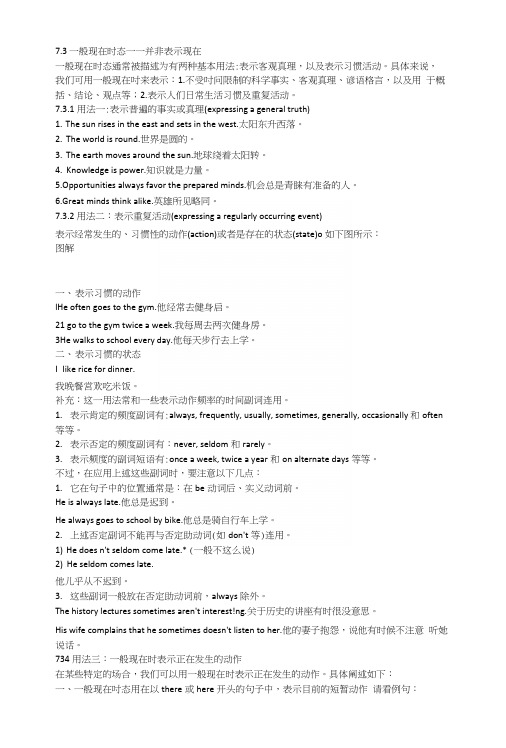
7.3 一般现在时态一一并非表示现在一般现在时态通常被描述为有两种基本用法:表示客观真理,以及表示习惯活动。
具体来说,我们可用一般现在吋来表示:1.不受吋问限制的科学事实、客观真理、谚语格言,以及用于概括、结论、观点等;2.表示人们日常生活习惯及重复活动。
7.3.1用法一:表示普遍的事实或真理(expressing a general truth)1.The sun rises in the east and sets in the west.太阳东升西落。
2.The world is round.世界是圆的。
3.The earth moves around the sun.地球绕着太阳转。
4.Knowledge is power.知识就是力量。
5.Opportunities always favor the prepared minds.机会总是青睐有准备的人。
6.Great minds think alike.英雄所见略同。
7.3.2 用法二:表示重复活动(expressing a regularly occurring event)表示经常发生的、习惯性的动作(action)或者是存在的状态(state)o如下图所示:图解一、表示习惯的动作lHe often goes to the gym.他经常去健身启。
21 go to the gym twice a week.我每周去两次健身房。
3He walks to school every day.他每天步行去上学。
二、表示习惯的状态I like rice for dinner.我晚餐営欢吃米饭。
补充:这一用法常和一些表示动作频率的时间副词连用。
1.表示肯定的频度副词有:always, frequently, usually, sometimes, generally, occasionally 和often 等等。
2.表示否定的频度副词有:never, seldom和rarely。
最新小学一般现在时(详细讲解)PPT课件

否定句的构成
主语 + 助动词(do/does)+not +动词原形 + 其他
These boys don’t(do not) like playing football.
These boys like playing football. The girl doesn’t (does not)read English every morning.
3. My cousins _e_n_j_o_y__(enjoy) computer games. But they d__o_n_’t_e_n_j_o_y_(not enjoy) ball games.
4. You ___li_k_e__(like) fish. But he _d_o_e_s_n_’t__li_k_e_(not like) fish.
常用的状语:often , sometimes , usually , every day 等。
3.表示不受时间限制的普遍真理和自然规律: e.g. Two and four is six. The moon goes around the earth.
2、频率副词
never
seldom
rarely
→There aren’t any books on the desk.
→Are there any books on the desk?
and or
• 变否定句时,and要变成or
There is some air and water on the moon . → There isn't any air or water on the moon.
助动词 + 主语 + 动词原形 + 其它?
最新四年级下册一般现在时
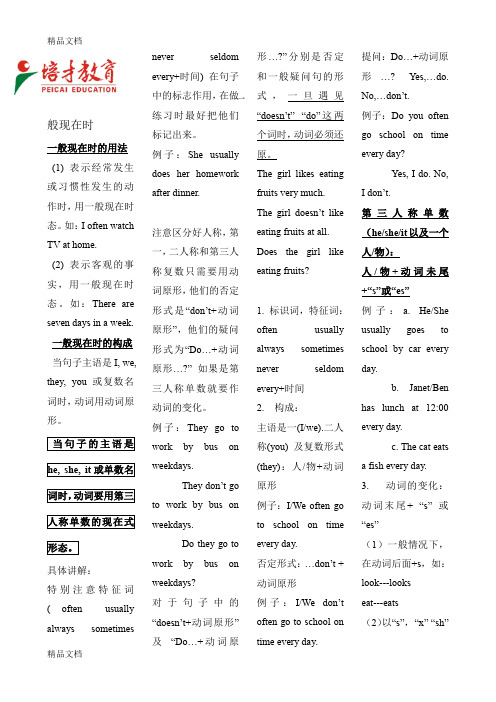
一般现在时一般现在时的用法 (1) 表示经常发生或习惯性发生的动作时,用一般现在时态。
如:I often watch TV at home. (2) 表示客观的事实,用一般现在时态。
如:There are seven days in a week. 一般现在时的构成 当句子主语是I, we, they, you 或复数名词时,动词用动词原形。
具体讲解: 特别注意特征词( often usually always sometimesnever seldom every+时间) 在句子中的标志作用,在做练习时最好把他们标记出来。
例子:She usually does her homework after dinner.注意区分好人称,第一,二人称和第三人称复数只需要用动词原形,他们的否定形式是“don’t+动词原形”,他们的疑问形式为“Do…+动词原形…?” 如果是第三人称单数就要作动词的变化。
例子:They go to work by bus on weekdays.They don’t go to work by bus on weekdays.Do they go to work by bus on weekdays?对于句子中的“doesn’t+动词原形” 及 “Do…+动词原形…?”分别是否定和一般疑问句的形式,一旦遇见“doesn’t” “do”这两个词时,动词必须还原。
The girl likes eating fruits very much. The girl doesn’t like eating fruits at all. Does the girl like eating fruits?1. 标识词,特征词:oftenusuallyalways sometimes neverseldomevery+时间 2. 构成: 主语是一(I/we).二人称(you) 及复数形式(they):人/物+动词原形例子:I/We often go to school on time every day.否定形式:…don’t + 动词原形例子:I/We don’t often go to school on time every day.提问:Do…+动词原形…?Yes,…do.No,…don’t. 例子:Do you often go school on time every day?Yes, I do. No, I don’t.第三人称单数(he/she/it 以及一个人/物):人/物+动词未尾+“s”或“es” 例子:a. He/She usuallygoestoschool by car every day.b. Janet/Ben has lunch at 12:00 every day.c. The cat eats a fish every day. 3. 动词的变化:动词末尾+ “s” 或“es”(1)一般情况下,在动词后面+s ,如:look---looks eat---eats(2)以“s”, “x” “sh”ch” “o”结尾的单词在词尾+“es”,如:watch---watcheswash---washes catch---catchesteach---teaches(3)以辅音字母+“y”结尾的单词,把“y”改为“i”再+“es”,如:fly---flies carry---carriestry---tries(4)特殊形式:have---has4. 否定形式:…doesn’t+动词原形例子:The old man plays chess in the morning.The old man doesn’t play chess in the morning.5.提问:Does…+动词原形…? Yes,…does. No,…doesn’t.例子:Does the old man play chess in the morning?Yes,he does. No, he doesn’t.巩固练习选择正确的答案填空,将其字母编号写在题前的括号内。
(word完整版)一般现在时

一、写出下列动词的第三人称单数talk______forget______hope______stop______perform______play______say_____ buy______worry______fly______study_______like_______make______take______ love_______recite_______become_______come_______drive_______shine_______ leave_____wake_______ride_______write_______hike______give______see______ swim______stop______shop_______plan______get_______sit_______let_______ cut_______ run_______ relax_______ begin_______wash_______watch_______ finish______ teach______ fish_______ reach_______ go______ do_____have______ kiss______tay______try______ hiss______fix______二、用括号内动词的适当形式填空。
1. He often ________(have) dinner at home.2。
Daniel and Tommy _______(be) in Class One.3。
We _______(not watch) TV on Monday.4。
Nick _______(not go) to the zoo on Sunday。
5. ______ they ________(like) the World Cup?6。
What _______they often _______(do) on Saturdays?7. _______ your parents _______(read) newspapers every day?8。
(完整word版)一般现在时态
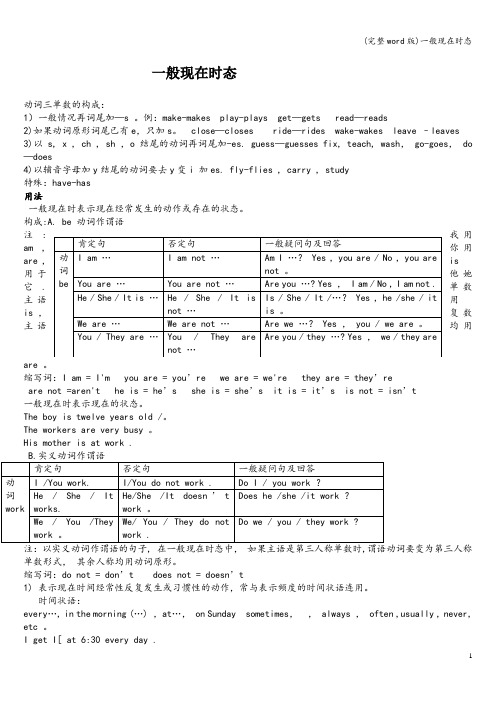
一般现在时态动词三单数的构成:1)一般情况再词尾加—s 。
例:make-makes play-plays get—gets read—reads2)如果动词原形词尾已有e,只加s。
close—closes ride—rides wake-wakes leave –leaves3)以s, x , ch , sh ,o 结尾的动词再词尾加-es. guess—guesses fix, teach, wash, go-goes, do —does4)以辅音字母加y结尾的动词要去y变i 加es. fly-flies , carry , study特殊:have-has用法一般现在时表示现在经常发生的动作或存在的状态。
构成:A. be 动词作谓语注: 我用Array am , 你用are , is用于他她它.单数主语用is ,复数主语均用are 。
缩写词:I am = I'm you are = you’re we are = we're they are = they’reare not =aren't he is = he’s she is = she’s it is = it’s is not = isn’t一般现在时表示现在的状态。
The boy is twelve years old /。
The workers are very busy 。
His mother is at work .单数形式,其余人称均用动词原形。
缩写词:do not = don’t does not = doesn’t1) 表示现在时间经常性反复发生或习惯性的动作,常与表示频度的时间状语连用。
时间状语:every…, in the morning (…) ,at…, on Sunday sometimes,, always , often ,usually , never, etc 。
I get I[ at 6:30 every day .She always helps others .He often goes to school on foot.I usually leave home for school at 7 every morning。
(word完整版)一般现在时

一般现在时一、一般现在时的含义一般现在时主要表示经常发生的动作或存在的状态。
二、一般现在时的用法1.表示经常、习惯性发生的动作或存在的状态。
He goes to work every day。
(他每天去上班.)2.表示普遍真理、科学事实、格言等不受时间限制的客观存在。
The moon goes around the earth.(月球围绕地球转。
)3.表示知觉、态度、感情等.I want your help.(我想要你的帮助。
)4.★在时间、条件状语从句中表示将来的动作。
If it doesn’t rain tomorrow,we’ll go to the Summer Palace.如果明天不下雨,我们就去颐和园。
5.★表示已经预先计划或安排的肯定将要发生的动作。
The train leaves at seven and arrives in New York at three tomorrow morning。
(火车7点出发,将于明天凌晨3点达到纽约。
)三、一般现在时的基本句型1.be动词的一般现在时:肯定句:主语+be(am/is/are)+...否定句:主语+be(am/is/are)+not +.。
is not = isn’t are not =aren't一般疑问Be(am/is/are)+主语+。
..?句:肯定回答:Yes, 主语(代词)+be动词.否定回答:No, 主语(代词)+be动词+not.疑问词+be动词+主语+……?特殊疑问句:be动词除了表示“……是……”之意,还表示“……在……”。
2.实义动词的一般现在时:主语第一人称、第二人称单复数第三人称复数第三人称单数肯定句:主语+ 动词原形+。
.。
主语+动词第三人称单数(—s)+...否定句:主语+don’t+ 动词原形+...don’t = do not 主语+ doesn't+ 动词原形+.。
doesn’t = does not一般疑问句:Do+主语+ 动词原形+。
知识点四年级动词时态
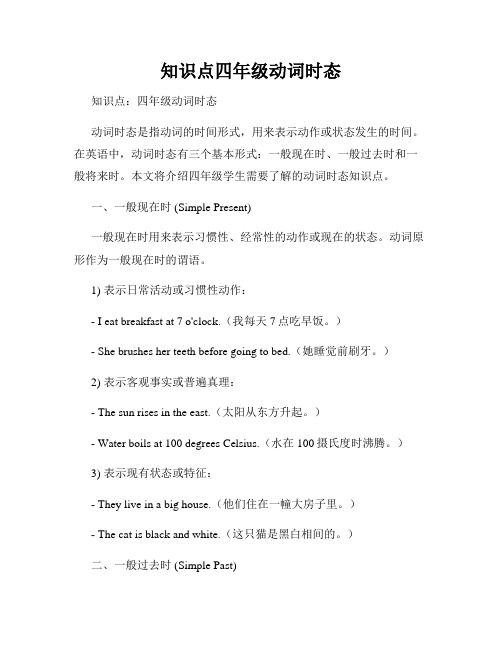
知识点四年级动词时态知识点:四年级动词时态动词时态是指动词的时间形式,用来表示动作或状态发生的时间。
在英语中,动词时态有三个基本形式:一般现在时、一般过去时和一般将来时。
本文将介绍四年级学生需要了解的动词时态知识点。
一、一般现在时 (Simple Present)一般现在时用来表示习惯性、经常性的动作或现在的状态。
动词原形作为一般现在时的谓语。
1) 表示日常活动或习惯性动作:- I eat breakfast at 7 o'clock.(我每天7点吃早饭。
)- She brushes her teeth before going to bed.(她睡觉前刷牙。
)2) 表示客观事实或普遍真理:- The sun rises in the east.(太阳从东方升起。
)- Water boils at 100 degrees Celsius.(水在100摄氏度时沸腾。
)3) 表示现有状态或特征:- They live in a big house.(他们住在一幢大房子里。
)- The cat is black and white.(这只猫是黑白相间的。
)二、一般过去时 (Simple Past)一般过去时用来表示过去某个时间发生或存在的动作或状态。
动词过去式作为一般过去时的谓语。
1) 表示过去发生的动作:- I watched a movie last night.(昨晚我看了一部电影。
)- She played soccer with her friends.(她和朋友们一起踢足球。
)2) 表示过去的经常性动作:- When I was a child, I often visited my grandparents.(我小的时候经常去看望爷爷奶奶。
)- We always went to the park on weekends.(我们周末总是去公园。
)3) 表示过去的状态或特征:- He had a pet dog when he was young.(他小时候有一只宠物狗。
四年级下英语语法讲解-一般将来时_人教版(pep )
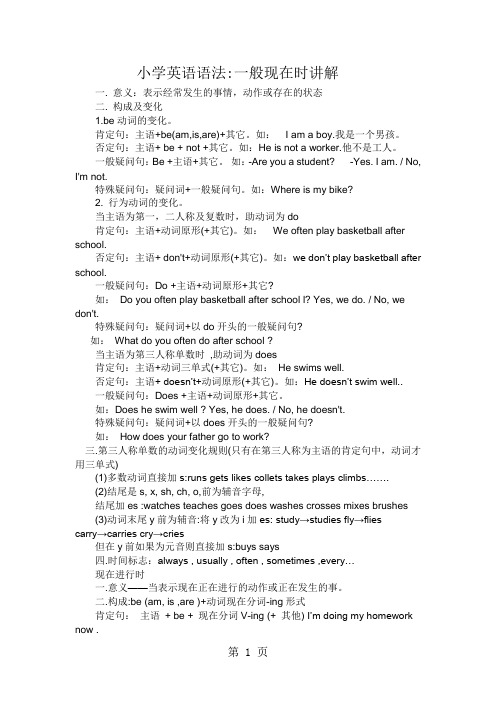
小学英语语法:一般现在时讲解一. 意义:表示经常发生的事情,动作或存在的状态二. 构成及变化1.be动词的变化。
肯定句:主语+be(am,is,are)+其它。
如:I am a boy.我是一个男孩。
否定句:主语+ be + not +其它。
如:He is not a worker.他不是工人。
一般疑问句:Be +主语+其它。
如:-Are you a student? -Yes. I am. / No, I'm not.特殊疑问句:疑问词+一般疑问句。
如:Where is my bike?2. 行为动词的变化。
当主语为第一,二人称及复数时,助动词为do肯定句:主语+动词原形(+其它)。
如:We often play basketball after school.否定句:主语+ don't+动词原形(+其它)。
如:we don’t play basketball after school.一般疑问句:Do +主语+动词原形+其它?如:Do you often play basketball after school l? Yes, we do. / No, we don't.特殊疑问句:疑问词+以do开头的一般疑问句?如:What do you often do after school ?当主语为第三人称单数时,助动词为does肯定句:主语+动词三单式(+其它)。
如:He swims well.否定句:主语+ doesn’t+动词原形(+其它)。
如:He doesn’t swim well..一般疑问句:Does +主语+动词原形+其它。
如:Does he swim well ? Yes, he does. / No, he doesn't.特殊疑问句:疑问词+以does开头的一般疑问句?如:How does your father go to work?三.第三人称单数的动词变化规则(只有在第三人称为主语的肯定句中,动词才用三单式)(1)多数动词直接加s:runs gets likes collets takes plays climbs…….(2)结尾是s, x, sh, ch, o,前为辅音字母,结尾加es :watches teaches goes does washes crosses mixes brushes(3)动词末尾y前为辅音:将y改为i加es: study→studies fly→fliescarry→carries cry→cries但在y前如果为元音则直接加s:buys says四.时间标志:always , usually , often , sometimes ,every…现在进行时一.意义——当表示现在正在进行的动作或正在发生的事。
小学四年级英语语法专项:一般现在时
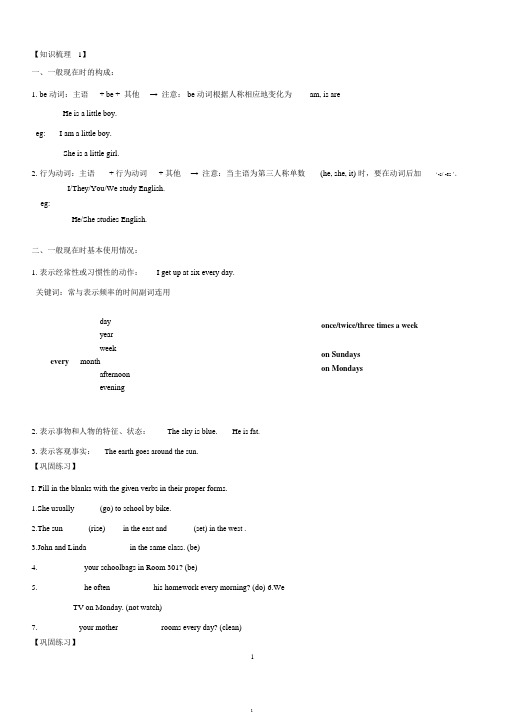
【知识梳理1】一、一般现在时的构成:1. be 动词:主语+ be + 其他→ 注意: be 动词根据人称相应地变化为am, is areHe is a little boy.eg:I am a little boy.She is a little girl.2. 行为动词:主语+ 行为动词+ 其他→ 注意:当主语为第三人称单数(he, she, it) 时,要在动词后加‘-s/ -es ’。
I/They/You/We study English.eg:He/She studies English.二、一般现在时基本使用情况:1. 表示经常性或习惯性的动作:I get up at six every day.关键词:常与表示频率的时间副词连用dayyearweekevery monthafternoonevening2. 表示事物和人物的特征、状态:The sky is blue.He is fat.3. 表示客观事实:The earth goes around the sun.【巩固练习】I. Fill in the blanks with the given verbs in their proper forms.1.She usually ______(go) to school by bike.2.The sun ______(rise)in the east and ______ (set) in the west .3.John and Linda __________ in the same class. (be)4.__________ your schoolbags in Room 301? (be)5.__________ he often __________ his homework every morning? (do)6.We __________ TV on Monday. (not watch)7.__________ your mother __________ rooms every day? (clean)【巩固练习】once/twice/three times a weekon Sundayson MondaysI.选择最恰当的答案() 1. _______ you have a book?A. DoB. AreC. IsD. Have() 2. They ________ on a farm.A. workingB. is workC. workD. is worked() 3. ---- Does Peter like to watch TV?---- _________.A. Yes, he likesB. No, he doesn’tC. Yes, he’ d likeD. No, he likes() 4. She doesn’ t _________ her homework in the afternoon.A. doingB. to doC. doesD. do() 5. How _________ Mr. Brown _________ to America?A. do, goB. is, goC. does, goD. does, goes() 6. Where ’ s my camera? I __________ it.A. am not findingB. am not seeingC. can ’ t findD. can ’t look at() 7. ---- How _________ he go to work?---- He _________ to work by bike.A. does; goB. do; goesC. do; goD. does; goes() 8. ---- ______ you usually late for school?---- No, _____________.A. Do; I amB. Does; notC. Are; I’ m notD. Are; I aren’t () 9. _______ she ________ home at six every day?A. Is, leaveB. Does, leaveC. Is, leavesD. Does, left() 10. Mr. Yang __________ English this term.A. teaches ourB. teaches usC. teach usD. teach our【知识梳理2】be 动词,行为动词句型:1.Be动词一般现在时的句型肯定句: sb+ be+其他be 根据人称变为am, is, areeg: He is a teacher.I am a student.They are workers.否定句: sb+ be+not+其他eg: He is not a teacher.I am not a student.They are not workers.一般疑问句: be+sb+其他Is he a teacher?-Yes, he is. / No, he isn’ t.Are you a student?Are they workers?特殊疑问句: What is he?2. 行为动词的变化肯定式: sb +do+ 其他eg: I like pork.第三人称单数:sb+does+ 其他eg: He likes pork.否定式: sb +don ’其t+他eg:I don’ t like pork. 第三人称单数:sb+doesn ’其t+他eg: He doesn’ t like pork.一般疑问句 : Do+ sb + 其他第三人称单数:Does + sb +其他eg: Do you like pork?eg:Does he like pork?-Yes, I do. / No, I don’ t.-Yes, he does. / No, he doesn .’t 特殊疑问句:What do you like? / What does he like?【例题精讲】1.按要求改写句子:1.Do you often play football after school? ( 肯定回答 ) __________________________________________.2.I have many books. (改为否定句) ___________________________________________.3. Gao Shan’ s sistereslikplaying table tennis (改为否定句)______________________________________________.4.She lives in a small town near New York. ( 改为一般疑问句) ______________________________________________.5.I watch TV every day. (改为一般疑问句) _______________________________________________ .【巩固练习】1.用括号内动词的适当形式填空1.He often ________ (have) dinner at home.2.Daniel and Tommy _______ (be) in Class One.3.We _______ (not watch) TV on Monday.4.Nick _______ (not go) to the zoo on Sunday.5.______ they ________ (like) the World Cup?6.What _______they often _______ (do) on Saturdays?7._______ your parents _______ (read) newspapers every day?8.The girl _______ (teach) us English on Sundays.9.She and I ________ (take) a walk together every evening.10.There ________ (be) some water in the bottle.基础题:I.用括号内动词的适当形式填空1.Mike _______ (like) cooking.2.They _______ (have) the same hobby.3.My aunt _______ (look) after her baby carefully.4.You always _______ (do) your homework well.5. I _______ (be) ill. I’ m staying in bed.6.She _______ (go) to school from Monday to Friday.7.Liu Tao _______ (do) not like PE.8.The child often _______ (watch) TV in the evening.9.Su Hai and Su Yang _______ (have) eight lessons this term.10. ---- What day _______ (be) it today? ---- It ’ s Saturday.II.按要求改写句子。
- 1、下载文档前请自行甄别文档内容的完整性,平台不提供额外的编辑、内容补充、找答案等附加服务。
- 2、"仅部分预览"的文档,不可在线预览部分如存在完整性等问题,可反馈申请退款(可完整预览的文档不适用该条件!)。
- 3、如文档侵犯您的权益,请联系客服反馈,我们会尽快为您处理(人工客服工作时间:9:00-18:30)。
一般现在时一般在的用法(1)表示常生或性生的作,用一般在。
如:I often watch TV at home.(2)表示客的事,用一般在。
如: There are seven days in a week.一般在的构成当句子主是 I, we, they, you 或复数名,用原形。
当句子的主是he, she, it 或数名,要用第三人称数的在式形。
具体解:特注意特征 ( often usually always sometimes never seldom every+) 在句子中的志作用,在做最好把他出来。
例子: Sheusually does her homework after dinner.注意区分好人称,第一,二人称和第三人称复数只需要用原形,他的否定形式是“don’t+ 原形”,他的疑形式“Do⋯+ 原形⋯?”如果是第三人称数就要作的化。
例子: They go to work by bus on weekdays.They don’ t go to work by bus on weekdays.Do they go to work by bus on weekdays?于句子中的“doesn’ t+原形”及“Do⋯+ 原形⋯?”分是否定和一般疑句的形式,一旦遇“doesn’t ”“两do个” ,必原。
The girl likes eating fruits very much.The girl doesn’ t like eating fruits at all.Does the girl like eating fruits?1. ,特征: often usually always sometimes never seldom every+2.构成:主是一 (I/we). 二人称 (you) 及复数形式 (they):人 /物+原形例子:I/We often go to school on time every day.否定形式:⋯don’t+ 原形例子: I/We don ’t often go to school on time every day.提: Do⋯+ 原形⋯? Yes, ⋯do. No,⋯don’t.例子: Do you often go school on time every day?Yes, I do. No, I don’ t.第三人称数( he/she/it 以及一个人 /物):人 /物 +未尾 +“s或” “es”例子: a. He/She usually goes to school by car every day.b. Janet/Ben has lunch at 12:00 every day.c. The cat eats a fish every day.3.的化:末尾 + “ s或”“ es”(1)一般情况下,在后面+s,如: look---looks eat---eats(2)以“s,”“x” “sh” “ ch尾”的“ o”在尾 +“es,”如: watch---watches wash---washescatch---catches teach---teaches ( 3 )以音字母+“y” 尾的,把“y”改“i再”+“es”,如:fly---flies carry---carriestry---tries(4)特殊形式:have---has4. 否定形式:⋯ doesn’ t+原形例子: The old man plays chess in the morning.The old man doesn’ t play chess in the morning.5.提: Does⋯+ 原形⋯ ? Yes, ⋯ does. No,⋯doesn’ t.例子: Does the old man play chess in the morning?Yes,he does. No, he doesn’ t.巩固正确的答案填空,将其字母号写在前的括号内。
() 1.My mother_______ housework every day.A. didB. doC. does() 2.The lion doesn’t______ the net three times a day.A. bitedB. biteC. biting() 3.He______ a big hole every week.A. makesB. is makingC. made() 4.Does the cat______ a mouse every hour?A. catchB. catchingC. catches() 5.He usually_______ the earth to the hill.A. carryB. carriesC. carrys() 6. My mother always_______ up at half six.A. gotB. getC. gets() 7. She often_____ under a big tree and _____ books in the morning.A. sit ⋯ readsB. sits ⋯ readC. sits⋯ reads () 8. ______ the boy ______ TV on weekdays?A. Do ⋯ watchesB. Does ⋯ watchC. Do ⋯ watch() 9.Their friend______ to the park every two days.A. goB. goesC. going() 10.He never______ a lot of water after he_____ football.A. drinks⋯ playB. drinks⋯ playsC. drink⋯ plays () 11. ____your mother _____ a car to get there every day?A. Does ⋯ driveB. Do ⋯ driveC. Do ⋯ drives() 12. He seldom______ anything.A. forgetB. forgotC. forgets() 13. She often______ over when she______ the baton.A. falls⋯ getsB. falls⋯ getC. fall ⋯ gets() 14.Janet______ the dog every morning.A. feedB. feedingC. feeds() 15.My father_______ well in the evening every day.A. doesn’ t feelB. don ’ t feelC. doesn ’ t feels (二 .在下面的后加 -s 或 -es .(1) catch_________(2) go_________(3) cost_________(4)fish________(5)listen_________(6)do____________(7) fall________(8)show__________(9)brush__________(三 . 翻。
1. I often __________ __________看()in the evening.2. Jack __________ __________踢(足球 ) every afternoon.3. Jane _______ _______( 物 )with her mother on the weekend.4. They all __________(喜 )English teacher.5. Jack often __________睡(觉 )at ten.6. Do they __________ __________吃(晚饭 )at home?7. We often__________跳(舞 )in music class.8. A chair__________(有 )four legs.(四) .用适当的动词形式填空 .(1)Wang Xin usually_________(get) up at 6:30. He________(get) up now .(2)Meihua usually_________(clean) his bedroom on Sunday. Now it ’nines o’ clock.He_________(clean) his bedroom.(3)Bill_________(not like) skipping. He_________(like) running.(4)My mother_________(make) noodles on Sunday. She_________(not make) pasta.(5)-_________ your sister_________(like) coffee? -No, but she_________(like) tea.(6)The bird sometimes_________(fly) high.(7)Today_________(be) my 12th birthday. My grandmother _________(give) me a doll.(8)The girl usually_________(plant) many plants in the spring every year.(9)Our music teacher_________(teach) us music on Monday afternoon.(10)He usually_________ (water) them in the morning.(11)He always_________(clean) slowly and ________(look) left and right(12)The young lady_________(clean) her bedroom every afternoon.(13)She never_________(go) to school late, and she always _________(do) well in class.(14)Usually, Tom _________(water) them two times a day.(15)May usually_________ (plant) many trees in spring.(五).仿照例句 ,写出下列动词的形式.例: sing sings singing(1)cut____________ _____________ (3)swim____________ ____________ (5)get____________ _____________ (7)ask___________ ______________(2) catch_____________ ____________ (4) take_____________ ____________ (6) run___________ _____________ (8)brush_____________ ____________。
